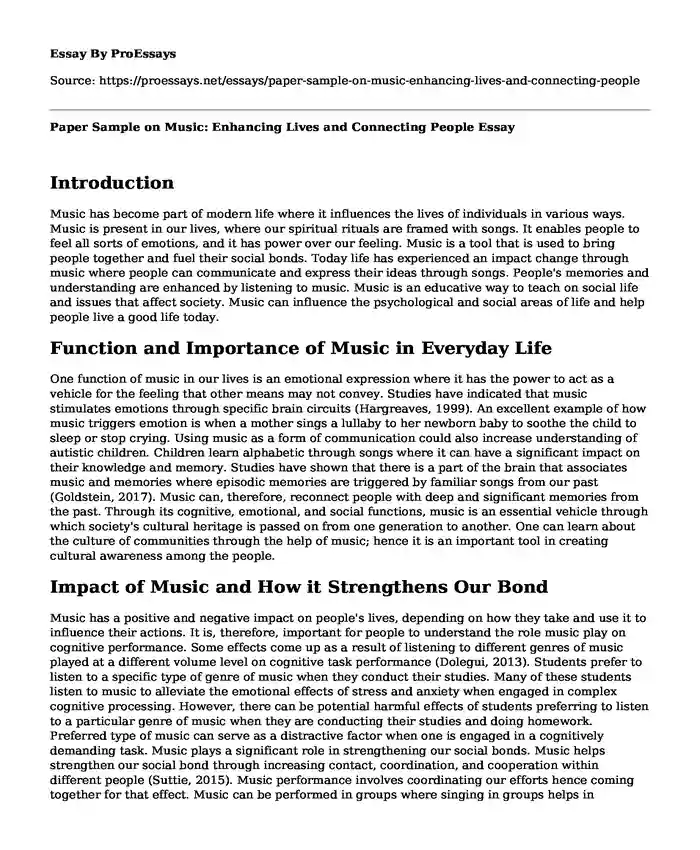Introduction
Music has become part of modern life where it influences the lives of individuals in various ways. Music is present in our lives, where our spiritual rituals are framed with songs. It enables people to feel all sorts of emotions, and it has power over our feeling. Music is a tool that is used to bring people together and fuel their social bonds. Today life has experienced an impact change through music where people can communicate and express their ideas through songs. People's memories and understanding are enhanced by listening to music. Music is an educative way to teach on social life and issues that affect society. Music can influence the psychological and social areas of life and help people live a good life today.
Function and Importance of Music in Everyday Life
One function of music in our lives is an emotional expression where it has the power to act as a vehicle for the feeling that other means may not convey. Studies have indicated that music stimulates emotions through specific brain circuits (Hargreaves, 1999). An excellent example of how music triggers emotion is when a mother sings a lullaby to her newborn baby to soothe the child to sleep or stop crying. Using music as a form of communication could also increase understanding of autistic children. Children learn alphabetic through songs where it can have a significant impact on their knowledge and memory. Studies have shown that there is a part of the brain that associates music and memories where episodic memories are triggered by familiar songs from our past (Goldstein, 2017). Music can, therefore, reconnect people with deep and significant memories from the past. Through its cognitive, emotional, and social functions, music is an essential vehicle through which society's cultural heritage is passed on from one generation to another. One can learn about the culture of communities through the help of music; hence it is an important tool in creating cultural awareness among the people.
Impact of Music and How it Strengthens Our Bond
Music has a positive and negative impact on people's lives, depending on how they take and use it to influence their actions. It is, therefore, important for people to understand the role music play on cognitive performance. Some effects come up as a result of listening to different genres of music played at a different volume level on cognitive task performance (Dolegui, 2013). Students prefer to listen to a specific type of genre of music when they conduct their studies. Many of these students listen to music to alleviate the emotional effects of stress and anxiety when engaged in complex cognitive processing. However, there can be potential harmful effects of students preferring to listen to a particular genre of music when they are conducting their studies and doing homework. Preferred type of music can serve as a distractive factor when one is engaged in a cognitively demanding task. Music plays a significant role in strengthening our social bonds. Music helps strengthen our social bond through increasing contact, coordination, and cooperation within different people (Suttie, 2015). Music performance involves coordinating our efforts hence coming together for that effect. Music can be performed in groups where singing in groups helps in improving people's health and happiness. Increased evidence suggests that choirs encourage social bonding to be more beneficial to the health of the group, especially mental health (Launey, 2015). Group singing help to lower the loneliness and isolation that comes when one is singing alone.
Conclusion
The evidence above clarifies that music can have a significant impact on our social lives, influencing how we associate with each other. The social context of musical behavior should be a more integral part of music psychology than has hitherto been the case. It is also important to use music in school to increase understanding among the student and their memories. People should know that music can also have a negative impact if not used in proper ways. Therefore, there should be a balance in listening to music and performing other tasks to avoid the negative implications that come from music.
References
Dolegui, A. S. (2013). "The Impact of Listening to Music on Cognitive Performance." Inquiries Journal/Student Pulse, 5(09). Retrieved from http://www.inquiriesjournal.com/a?id=1657
Goldstein, B. (2017). The Fascinating Ways That Music Affects Your Mood and Mind. http://www.dailygood.org/story/1613/music-and-the-brain-the-fascinating-ways-music-affects-your-mood-and-mind/
Hargreaves, J. (1999). The function of music in everyday life. Redefining the social in music psychology.
Launey, J. (2015). Choir singing improves health, and happiness – and is the perfect icebreaker. Journal of education. The University of Oxford. https://theconversation.com/choir-singing-improves-health-happiness-and-is-the-perfect-icebreaker-47619
Suttie, J. (2015). Four Ways Music Strengthens Social Bonds. Science-based insight for a meaningful life. https://greatergood.berkeley.edu/article/item/four_ways_music_strengthens_social_bonds
Cite this page
Paper Sample on Music: Enhancing Lives and Connecting People. (2023, Oct 29). Retrieved from https://proessays.net/essays/paper-sample-on-music-enhancing-lives-and-connecting-people
If you are the original author of this essay and no longer wish to have it published on the ProEssays website, please click below to request its removal:
- Paper Example on Divorce in Sharia Law
- Paper Example on Work-Family Conflict
- Comparison of The Odyssey and O Brother, Where Art Thou?
- Essay Sample on the Importance of Ethics in Human Services
- Essay Example on War Room: A Director's Journey of Crafting a Masterpiece
- Black Boys' Academic Success Boosted By Black Teachers - Essay Sample
- Paper Example on New Family Therapeutic Approach for Sexual Minority Youth & Evaluated Interventions







